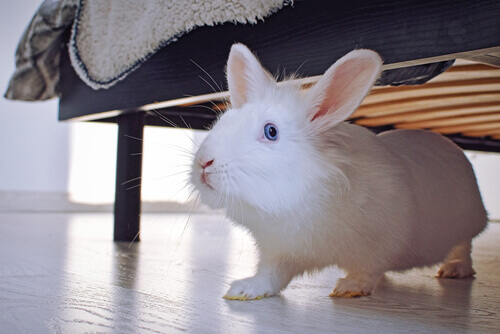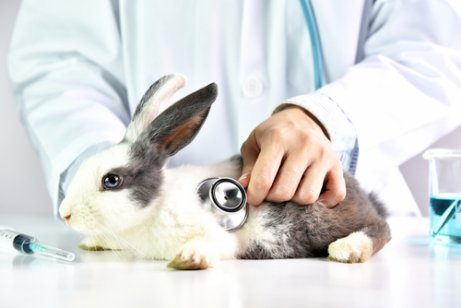Stress in Rabbits: How to Deal With It

Just like humans, animals can also experience stress. This is true in the wild, as well as in captivity as pets. For example, in the case of rabbits, they can show a series of symptoms related to stress that can ultimately be fatal if not treated in time. In this article, we’ll give you tips on how to deal with stress in rabbits effectively.
Stress in rabbits: a silent disease
Emotional stress is a disease that affects both the psychological and physical performance of animals. Without a doubt, stress can manifest itself in different ways in each species. However, combating stress requires a lot of time and patience.
For example, in the case of rabbits, you should keep in mind that these are animals that are generally on the lowest level of the food chain. Although you can tame them, they still have survival instincts. As a result, this makes adaptation to new environments more complicated.
However, some ways to help keep your rabbit calm are to provide them with open spaces, objects to gnaw on, and avoid loud noises. On the other hand, if you notice that your rabbit seems stressed, you need to be careful to deal with the situation properly.

How stress in rabbits manifests
In rabbits, stress manifests itself in many ways. This is especially true when owners aren’t caring for their basic needs properly.
Rabbits, which are from the Leporidae family, are very silent and calm animals during the day. This is because they are nocturnal. As a result, they prefer to feed at night when they feel safer, away from predators. Any sudden change to their typical behavior should be a warning to you.
Signs of stress
The first warning sign is if your pet starts screaming loudly and often. Rabbit screams are very loud and specific. This is a way that they warn their group of possible dangers and predators.
Changes in mood and routine are also signs that something is wrong. For example, making a lot of noise, kicking their cage, or gnashing their teeth are ways they release anger. They also can do these behaviors to express dominance in the presence of another male. However, if your rabbit lives alone or with a female rabbit, these actions are a serious warning sign.
Similarly, rabbits are rarely still for long periods of time. Their nature is to be curious. As a result, they are usually exploring or monitoring their surroundings. However, if your rabbit is still for long periods, this means they are afraid, which should be a warning sign that something is wrong.

Staying still as a reaction to fear is very common. For example, they can do this to hide from predators if they find a good hiding place. However, in this case, your home should be like one big hiding place for them! It’s normal to see this behavior in front of large pets or strangers.
A more serious case is self-mutilation. For example, rabbits can resort to this when they feel a great deal of pressure or pain somewhere in their bodies. This can begin with constantly licking a limb. However, in the most extreme cases, they can begin to chew on the limb or even try to gnaw it off.
What to do in these cases
While these symptoms sound very alarming, don’t worry! There are simple remedies to stress in rabbits. You just need to give your pet the time and freedom to get better as soon as possible. First, we recommend you visit a vet. Vets are specialists and will know how best to address the problem. Here are some other things you can do:

- Make sure to give your rabbit some freedom from time to time. Rabbits can go crazy if they are kept locked up constantly. To avoid this, let your rabbit run free inside your house or even in your yard. However, you’ll need to be alert and make sure they don’t eat anything they shouldn’t while hopping around.
- Give them something to chew on. Rabbits love to nibble on things and it’s actually a great way for them to relieve stress. In their burrows, they usually have several objects to gnaw on. You should give your rabbit some objects to satisfy this need.
- Try to keep their area peaceful. Very loud noises or sudden scares are one of the main causes of stress. As a result, the room where you keep your rabbit should be as quiet as possible. Also, if you do have visitors over, don’t let them get too close.
- Clean their cage regularly. Rabbits don’t like to live in dirty environments. Being trapped in a dirty cage can start to upset them. Be sure to clean their cage regularly to avoid them getting angry or upset!
Just like humans, animals can also experience stress. This is true in the wild, as well as in captivity as pets. For example, in the case of rabbits, they can show a series of symptoms related to stress that can ultimately be fatal if not treated in time. In this article, we’ll give you tips on how to deal with stress in rabbits effectively.
Stress in rabbits: a silent disease
Emotional stress is a disease that affects both the psychological and physical performance of animals. Without a doubt, stress can manifest itself in different ways in each species. However, combating stress requires a lot of time and patience.
For example, in the case of rabbits, you should keep in mind that these are animals that are generally on the lowest level of the food chain. Although you can tame them, they still have survival instincts. As a result, this makes adaptation to new environments more complicated.
However, some ways to help keep your rabbit calm are to provide them with open spaces, objects to gnaw on, and avoid loud noises. On the other hand, if you notice that your rabbit seems stressed, you need to be careful to deal with the situation properly.

How stress in rabbits manifests
In rabbits, stress manifests itself in many ways. This is especially true when owners aren’t caring for their basic needs properly.
Rabbits, which are from the Leporidae family, are very silent and calm animals during the day. This is because they are nocturnal. As a result, they prefer to feed at night when they feel safer, away from predators. Any sudden change to their typical behavior should be a warning to you.
Signs of stress
The first warning sign is if your pet starts screaming loudly and often. Rabbit screams are very loud and specific. This is a way that they warn their group of possible dangers and predators.
Changes in mood and routine are also signs that something is wrong. For example, making a lot of noise, kicking their cage, or gnashing their teeth are ways they release anger. They also can do these behaviors to express dominance in the presence of another male. However, if your rabbit lives alone or with a female rabbit, these actions are a serious warning sign.
Similarly, rabbits are rarely still for long periods of time. Their nature is to be curious. As a result, they are usually exploring or monitoring their surroundings. However, if your rabbit is still for long periods, this means they are afraid, which should be a warning sign that something is wrong.

Staying still as a reaction to fear is very common. For example, they can do this to hide from predators if they find a good hiding place. However, in this case, your home should be like one big hiding place for them! It’s normal to see this behavior in front of large pets or strangers.
A more serious case is self-mutilation. For example, rabbits can resort to this when they feel a great deal of pressure or pain somewhere in their bodies. This can begin with constantly licking a limb. However, in the most extreme cases, they can begin to chew on the limb or even try to gnaw it off.
What to do in these cases
While these symptoms sound very alarming, don’t worry! There are simple remedies to stress in rabbits. You just need to give your pet the time and freedom to get better as soon as possible. First, we recommend you visit a vet. Vets are specialists and will know how best to address the problem. Here are some other things you can do:

- Make sure to give your rabbit some freedom from time to time. Rabbits can go crazy if they are kept locked up constantly. To avoid this, let your rabbit run free inside your house or even in your yard. However, you’ll need to be alert and make sure they don’t eat anything they shouldn’t while hopping around.
- Give them something to chew on. Rabbits love to nibble on things and it’s actually a great way for them to relieve stress. In their burrows, they usually have several objects to gnaw on. You should give your rabbit some objects to satisfy this need.
- Try to keep their area peaceful. Very loud noises or sudden scares are one of the main causes of stress. As a result, the room where you keep your rabbit should be as quiet as possible. Also, if you do have visitors over, don’t let them get too close.
- Clean their cage regularly. Rabbits don’t like to live in dirty environments. Being trapped in a dirty cage can start to upset them. Be sure to clean their cage regularly to avoid them getting angry or upset!
All cited sources were thoroughly reviewed by our team to ensure their quality, reliability, currency, and validity. The bibliography of this article was considered reliable and of academic or scientific accuracy.
- Villamayor, P. R., Echevarría, M. L., & Grau, A. N. (2017). Estres en conejos domesticos. Una revision. Revista Complutense de Ciencias Veterinarias, 11(Especial), 265.
- Iglauer, F., Beig, C., Dimigen, J., Gerold, S., Gocht, A., Seeburg, A., … & Willmann, F. (1995). Hereditary compulsive self-mutilating behaviour in laboratory rabbits. laboratory Animals, 29(4), 385-393.
This text is provided for informational purposes only and does not replace consultation with a professional. If in doubt, consult your specialist.








